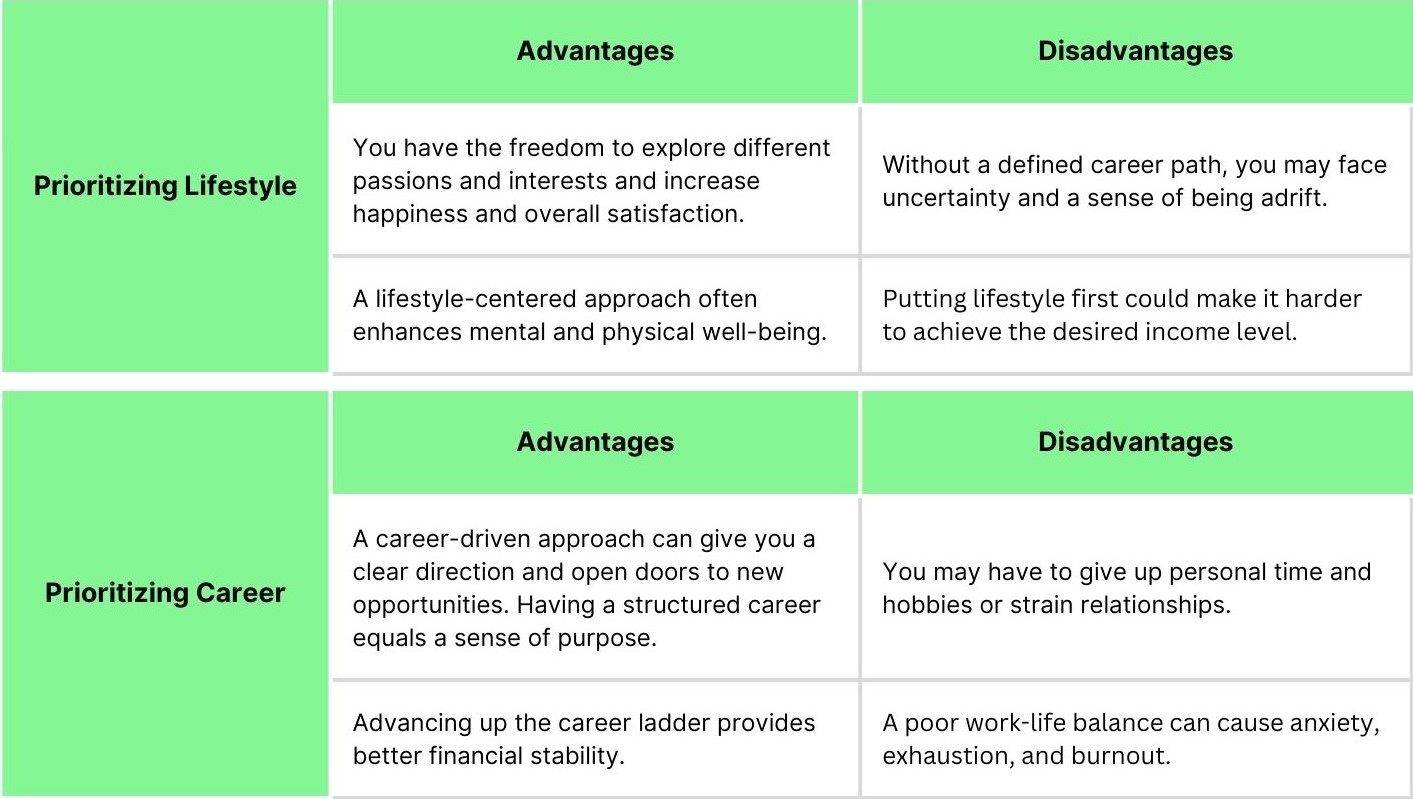We are used to how careers define our lifestyles and commonly look for a job with a decent salary and matching skills, ignoring the schedule. Even though work formats have evolved with technologies, we still wonder if our style of living is worth shaping job choices and not the other way around. “Isn’t it risky?” you might ask. And you will be right in a way. Despite that, before jumping to conclusions, we will review the pros and cons of each approach—lifestyle adapting the career and career adapting the lifestyle.
Weighing the options: career vs. lifestyle focus
What comes to mind when mentioning the term lifestyle? The Cambridge Dictionary defines a lifestyle as a way of living—the things we usually do, where we live, what we spend our money on, and other daily routines. Lifestyle is also about our values and relationships with other people.
If we speak about things we usually do, we speak about a job or hobbies. If we speak about where we live, what we spend our money on, and the people we meet, a job is directly tied to the matter. That’s why a career is a driving force in our life.
Deciding whether to build a career around your lifestyle or shape your lifestyle around your career is a personal choice that depends on your values, goals, and life circumstances. Here are the advantages and disadvantages of both approaches.

The best scenario is when you can complement your career and lifestyle or choose a career close to your daily schedule. However, life is not linear, and you may need to temporarily focus strictly on one way or another, like putting all your efforts into career advancement or personal growth.
How can you understand that it’s time to question the career format you have?
If you notice that your work negatively affects other aspects of life: relationships, time to do things you love, self-care activities, and finally, health—think it over. A World Health Organization study finds long working hours increase heart disease. Working 55 hours or more per week is a serious health hazard. Besides, work values that don’t match your personal values decrease motivation. Work activities that don’t match your personal interests decrease productivity.
Overall, any work format cannot perfectly meet all needs, but you have the power to choose what truly matters to you.
How can you start changing the career format?
In the first place, define your priorities and interests, and, of course, pay attention to life circumstances. Fair enough that you cannot neglect the financial side if you have a family to care for. In case you hesitate or feel confused about identifying those areas, career coaching exercises will come in handy. Or a career coach for a career change who can create a personalized career plan for you. Let’s examine two cases where online career coaching services can be valuable.
Never-ending work cycle and professional frustration
Meet Lynette, a sales executive with years of experience in a high-stress corporate job.

Her typical day starts at 6 AM. and ends past 11 PM., because of two schoolchildren, chores, and work often spilling into her weekends. Lynette is passionate about her job and invests in her professional development for career growth. In addition, her current schedule demands business trips because of on-site client visits.
She thinks the more hours she dedicates to a job, the better it pays, but over time, the strain on her personal life and health becomes clear. Her relationships with her husband and children worsen due to the lack of time spent together. Since Lynette loves her family and wishes to devote more time to them, she is torn apart and develops chronic stress-related insomnia and anxiety.
Lynette’s situation is not uncommon. In fact, long working hours are linked to a higher risk of anxiety and depression. Overwork can also disrupt social relationships. If you find yourself in a similar situation, it’s worth considering whether your career truly serves your life—or if it’s draining you.
Career coaching solution
In Lynette’s case, career coaching practices can:
- Improve work-life balance
- Navigate career transition to a hybrid format (remote work with required trips to clients)
- Assist in recalling a dream job and evaluating achievements at the company to appreciate progress
Fulfilling potential and combining two occupations
Take Richard, for example, a biotechnology technician at a mid-sized company who cannot advance or make changes that would give him fulfillment.

He often dreams of reaching his potential in the music industry, mainly by starting a music production agency, but is okay with his current job at the same time.
Richard’s career doesn’t align with his ambitions and offers no room for growth, though it matches his degree and skills and maintains a secure income. Despite excelling at his job, he feels trapped by the rigid corporate structure that doesn’t offer opportunities for creativity or upward mobility.
So, Richard is stuck and cannot make the right decision. This sense of being stuck not only affects professional satisfaction but also leads to a decline in overall motivation and mental well-being. Like Richard, you may stay in a job that no longer serves you out of fear of the unknown, financial instability, or because you don’t believe other opportunities are within reach. However, remaining in an unfulfilling job can have long-term consequences on your happiness and career trajectory.
Career coaching solution
With the help of a personal career coach, Richard can:
- Combine two work formats: a freelance approach with music gigs on demand and part-time engineering services based on a contract in a company
- Vacancies browsing
- Goal-setting session for both career fields and directions
- Cover letter writing
In both stories, the core issue is the same: Lynette’s and Richard’s careers dictate their lives rather than vice versa. Taking a pause, analyzing a career situation from a different angle, and making reasonable changes are what the two of them will benefit from. And career coaching can be of assistance here.
Conclusion
Job is not always about money. It’s also about fitting into your life. You cannot find a job that is fully satisfying, but you can find one close to sound, as work formats are flexible nowadays. One role may combine hundreds of activities unrelated to the first sight or those that intersect responsibilities. Consider not only formats like remote and corporate but also social factors—whether you feel comfy working in silos or crave company. Not to mention cases where sitting at the desk all day long is a nut to crack.
Career coaching is your instrument for remaining on track and fluent with your career choices. At Amy, you can try self-coaching exercises or consult a career coach who will help you maintain happy relationships with yourself and the world around you throughout your career. In the meantime, reflect on your interests and priorities to make an informed career choice that aligns with your desired lifestyle.
